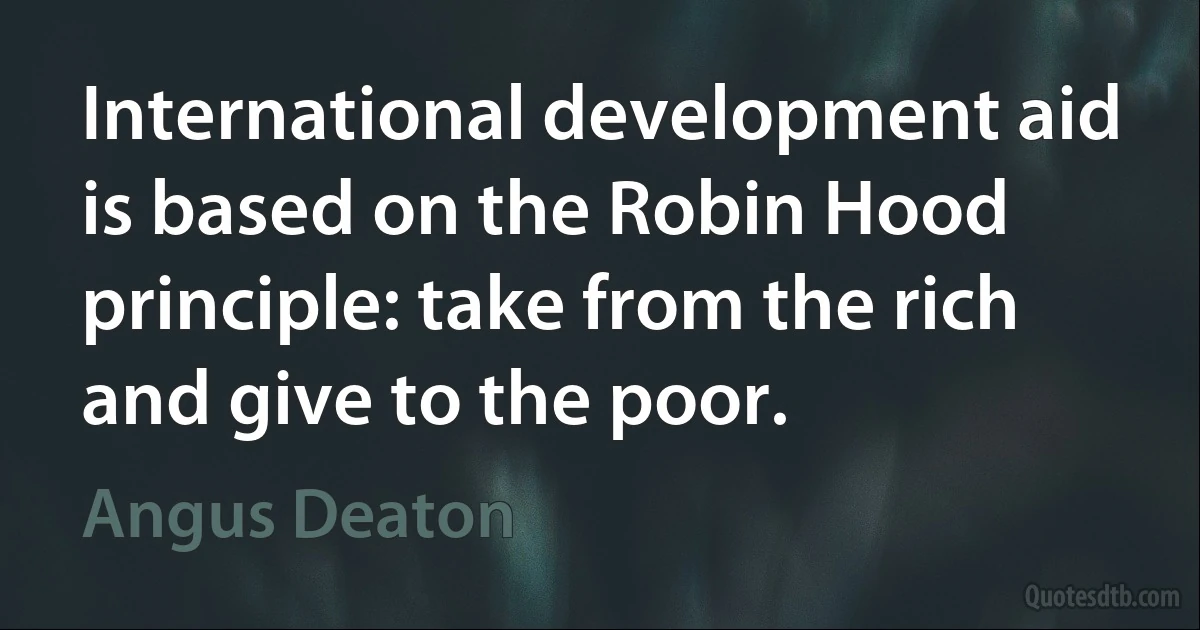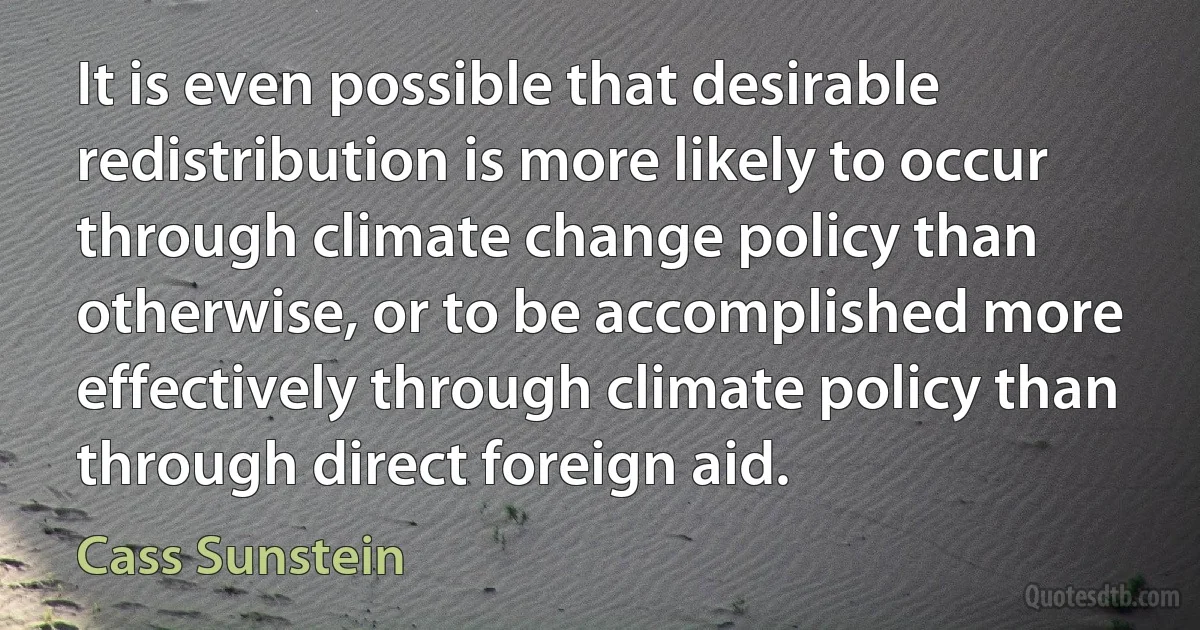Aid Quotes - page 16
Therefore, come to our aid you who alone are able. For this rivalry exists for sake of you, whom alone they revere in everything that all seem to worship. For each one desires in all that he seems to desire only the good which you are; no one is seeking with all his intellectual searching for anything else than the truth which you are. For what does the living seek except to live? What does the existing seek except to exist?

Nicholas of Cusa
It's a terrible blow for the world when countries as rich and talented and stable and well-off as this country doesn't fulfil the global responsibility of at least 0.7% of 1% of GDP in development aid. It's a terrible blow. If we all did it, we would save millions of lives, we would have all the kids in school. They would be growing up to be productive members of their society, we wouldn't have the mass refugee movements. We would have a completely different dynamic in the world. My country's spending 30 times more on the military than it is on development assistance right now.

Jeffrey D. Sachs
I would tell you what you're saying is a glib slogan...not a reality about what development aid is about. And please, Australia, please do your part. You're a rich, wonderful, beautiful country that can afford to do more. And poor desperate children need it so that they can grow up to be healthy and be productive in our world. And, Australia, really, we count on you for that.

Jeffrey D. Sachs
Economic hit men (EHMs) are highly paid professionals who cheat countries around the globe out of trillions of dollars. They funnel money from the World Bank, the U. S. Agency for International Development (USAID), and other foreign "aid” organizations into the coffers of huge corporations and the pockets of a few wealthy families who control the planet's natural resources. Their tools include fraudulent financial reports, rigged elections, payoffs, extortion, sex, and murder. They play a game as old as empire, but one that has taken on new and terrifying dimensions during this time of globalization. I should know; I was an EHM.

John Perkins
As I write, I control my anxiety and anguish thanks to the invaluable aid of irony and humor. But every night I am subdued by an anxiety that knows no irony, and I must wait until the next day to rediscover the blend of anguish and humor that characterizes my writing and that generates my style.

Enrique Vila-Matas
I have done my best to this single end, to aid as many as possible in a very recondite as well as laborious matter, and truly and completely to describe the structure of the human body which is formed not of ten or twelve parts-- as it may seem to the spectator-- but of some thousands of different parts.

Andreas Vesalius
Protocols:
Number 17, paras. 7,8
Our kingdom will be an apologia of the divinity Vishnu, in whom is found its personification – in our hundred hands will be, one in each, the springs of the machinery of social life. We shall see everything without the aid of official police.... In our programs one-third of our subjects will keep the rest under observation....
Our agents will be taken from the higher as well as the lower raniks of society, from among the administrative class who spend their time in amusements, editors, printers, and publishers, booksellers, clerks, and salesmen, workmen, coachmen, lackeys, et cetera....

Will Eisner
Protocols:
Number 1, paras. 9,10
If every State has two foes, and if in regard to the external foe it is allowed and not considered immoral to use every manner and art of conflict, as for example to keep the enemy in ignorance of plans of attack and defense, to attack him by night or in superior numbers, then in what way can the same means in regard to a worse foe, the destroyer of the structure of society and the commonweal, be called immoral and not permissible?
Is it possible for any sound logical mind to hope with any success to guide crowds by the aid of reasonable counsels and arguments,, when any objection or contradiction, senseless though it may be, can be made and when such objection may find more favor with the people, whose powers of reasoning are superficial?
Graves: The basic ideas are the same despite word changes like... "two kinds of enemies” versus, "two foes.”.

Will Eisner
Sultan Mahmud at first designed in his heart to go to Sijistan, but subsequently preferred engaging previously in a holy war against Hind, and he distributed arms prior to convening a council on the subject, in order to secure a blessing on his designs, of exalting the standard of religion, of widening the plain of right, of illuminating the words of truth, and of strengthening the power of justice. He departed towards the country of Hind, in full reliance on the aid of Allah, who guiding by his light and by his power, bestowed dignity upon him, and gave him victory in all expeditions. On his reaching Purshaur (Peshawar), he pitched his tent outside the city...

Mahmud of Ghazni
So he prayed to the Almighty for aid, and left Ghazni on the 10th of Sha'ban 414 H., with 30,000 horse besides volunteers, and took the road to Multan which place he reached in the middle of Ramazan. The road from thence to India was through a barren desert, where there were neither inhabitants or food. So he collected provisions for the passage, and loading 30,000 camels with water and corn, he started for Anhilwara. After he had crossed the desert, he perceived on one side a fort full of people, in which there were wells. people came down to conciliate him, but he invested the place, and God gave him victory over it, for the hearts of the inhabitants failed them through fear. So he brought the place under the sway of Islam, killed the inhabitants, and broke in pieces their images. His men carried away water with them from thence and marched for Anhalwara, where they arrived at the begging of Zi-l Ka'da.

Mahmud of Ghazni
By another way, therefore, I endeavoured to attain the same end; and since it is a property of water that a small quantity of it, converted into steam by the force of heat, has an elastic force like that of the air, but, when cold supervenes, is again resolved into water, so that no trace of the said elastic force remains; I felt confident that machines might be constructed wherein water, by means of no very intense heat, and at small cost, might produce that perfect vacuum which had failed to be obtained by aid of gunpowder. But of the various constructions which can be contrived for this purpose, the following seemed to me to be the most suitable.

Denis Papin


![The Government of the fort of Kohram and of Samana was made over by the Sultan to Kutbu-d din... [who] by the aid of his sword of Yemen and dagger of India became established in independent power over the countries of Hind and Sind' He purged by his sword the land of Hind from the filth of infidelity and vice, and freed the whole of that country from the thorn of God-plurality, and the impurity of idol-worship, and by his royal vigour and intrepidity, left not one temple standing. (Muhammad of Ghor)](https://cdn.quotesdtb.com/img/quotes_images_webp/50/muhammad-of-ghor-aid-950250.webp)
